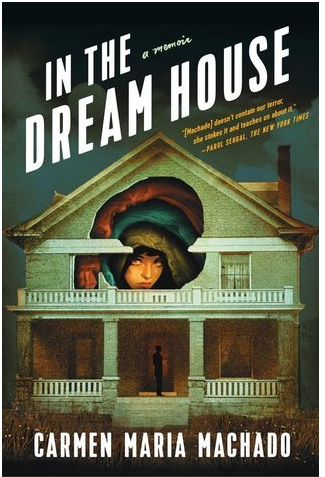Machado, Carmen Maria. In the dream house: a memoir. Graywolf Press. 2019. $26.00. 247 pages. 9781644450031.
 “I speak into the silence. I toss the stone of my story into a vast crevice; measure the emptiness by its small sound,” Machado writes as she begins In the Dream House. She begins her memoir by entering it in the archive of abusive same-sex relationships, claiming that space as hers, painful as it is. “Why?” a reader might ask, would someone want to rip open the wounds of abuse for the purpose of documentation?
“I speak into the silence. I toss the stone of my story into a vast crevice; measure the emptiness by its small sound,” Machado writes as she begins In the Dream House. She begins her memoir by entering it in the archive of abusive same-sex relationships, claiming that space as hers, painful as it is. “Why?” a reader might ask, would someone want to rip open the wounds of abuse for the purpose of documentation?
Machado never quite answers that question, but she doesn’t have to. The stories she tells, small vignettes that play with storytelling for and narrative tropes, speak for themselves – the fuzzy and tender beginning of a relationship; the comfortable and quiet middle; and then, suddenly, the desperate, visceral pain of realizing your loved one has another side to them – a side that doesn’t trust, that doesn’t care, that doesn’t support you.
Machado uses storytelling motifs in a unique and original way (Choose your own adventure, lipogram, unreliable narrator, star-crossed lovers) to bring both despair and dark, crisp humor to what is, essentially, a heartbreaking story. These motifs and tropes are done so well, the fragmented nature of them barely registers. This narrative choice is rewarded again and again, as the reader can’t help but feel closer to Machado as the story continues.
When pitched as a “memoir about same-sex abuse,” Machado’s work succeeds. Pitched as “a memoir about infatuation, self-denial, and hope,” it also succeeds. It is more than the sum of its parts, and let it not be forgotten that Machado is a bisexual woman, and all the baggage that comes with. The abuse that Machado is dealt from her partner knows no labels, but other bisexual women will surely see themselves in Machado nonetheless. In the Dream House surpasses all queer identification of it, because it does it so well – it is a classic, full-stop. Not a queer classic (although it is), not a WLW memoir of abuse (although it is), and not as an original memoir (although it is). It is a thought-provoking classic work that makes you feel, intimately, every word. Full stop.
Rachel R. Newlin, MLIS
Cataloging Librarian, Schaumburg Township District Library
Member, GLBTRT Reviews Committee, 2018-2020